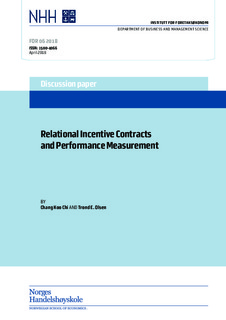| dc.contributor.author | Chi, Chang Koo | |
| dc.contributor.author | Olsen, Trond E. | |
| dc.date.accessioned | 2018-05-02T12:51:03Z | |
| dc.date.available | 2018-05-02T12:51:03Z | |
| dc.date.issued | 2018-04-30 | |
| dc.identifier.issn | 1500-4066 | |
| dc.identifier.uri | http://hdl.handle.net/11250/2496783 | |
| dc.description.abstract | This paper analyzes relational contracts under moral hazard. We first show that if the available information (signal) about effort satisfies a generalized monotone likelihood ratio property, then irrespective of whether the first-order approach (FOA) is valid or not, the optimal bonus scheme takes a simple form. The scheme rewards the agent a fixed bonus if his performance index exceeds a threshold, like the FOA contract of Levin (2003), but the threshold can be set differently. We next derive a sufficient and necessary condition for non-verifiable information to improve a relational contract. Our new informativeness criterion sheds light on the nature of an ideal performance measure in relational contracting. | nb_NO |
| dc.language.iso | eng | nb_NO |
| dc.publisher | FOR | nb_NO |
| dc.relation.ispartofseries | Discussion paper;6/18 | |
| dc.subject | Relational contracts | nb_NO |
| dc.subject | non-verifiable performance measures | nb_NO |
| dc.subject | first-order approach | nb_NO |
| dc.subject | bonus scheme | nb_NO |
| dc.subject | informativeness criterions | nb_NO |
| dc.title | Relational Incentive Contracts and Performance Measurement | nb_NO |
| dc.type | Working paper | nb_NO |
| dc.source.pagenumber | 34 | nb_NO |
